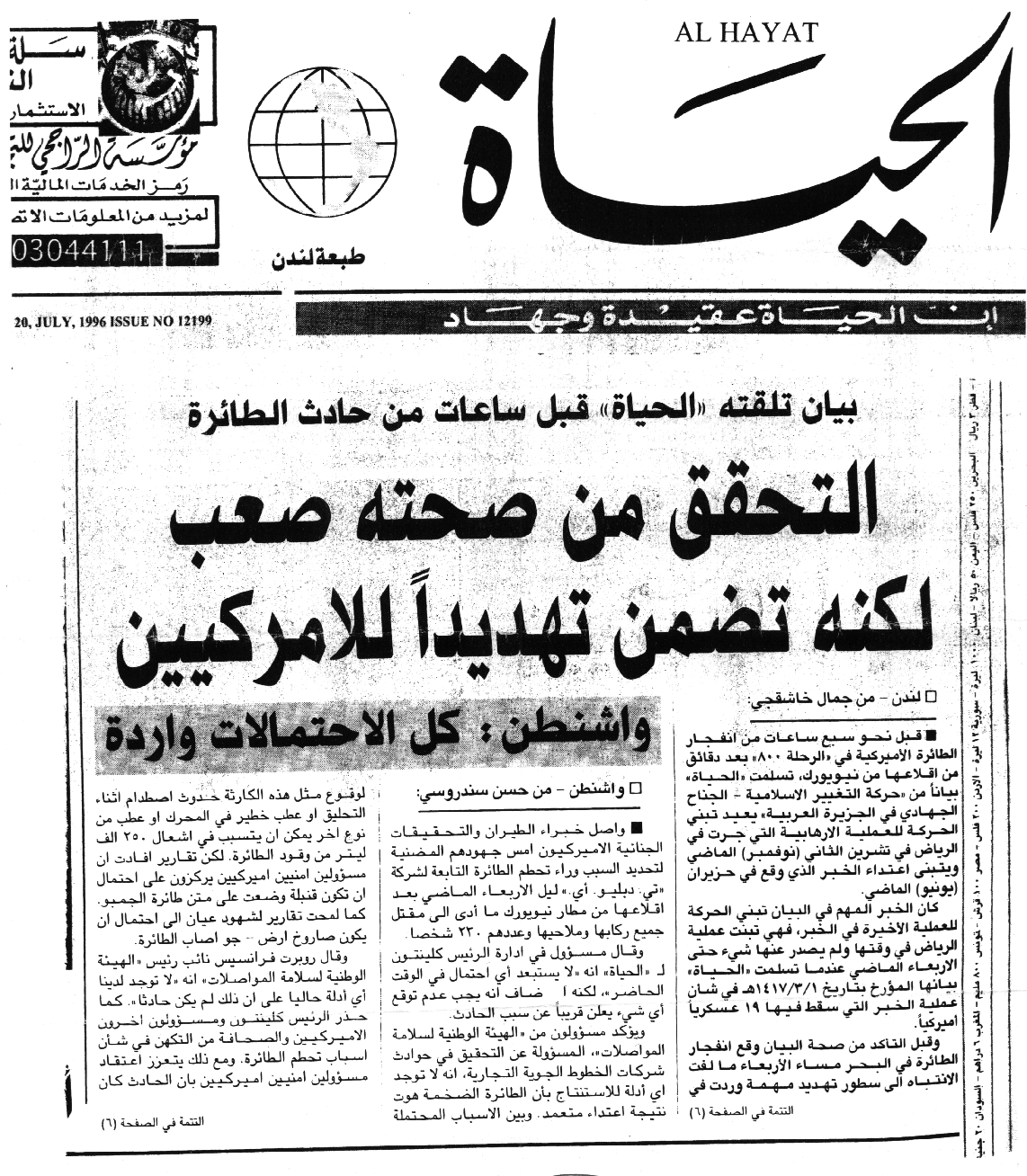 Saudi Arabia has lifted its four day ban on pan-Arab daily Al-Hayat. The internationally published influential newspaper, had been banned by Riyadh who tried to unsuccessfully pressure the paper into firing columnist Abdelaziz Al-Suwaid. Al-Suwaid had recently published articles critical of the Saudi administration. He castigated the agricultural ministry’s handling of the mysterious death of some 2,000 camels and also blamed the health ministry for the death of a young girl from a medical operation. A Saudi government spokesman would only say “There was a misunderstanding with the Ministry of Information which has now been cleared up”.
Saudi Arabia has lifted its four day ban on pan-Arab daily Al-Hayat. The internationally published influential newspaper, had been banned by Riyadh who tried to unsuccessfully pressure the paper into firing columnist Abdelaziz Al-Suwaid. Al-Suwaid had recently published articles critical of the Saudi administration. He castigated the agricultural ministry’s handling of the mysterious death of some 2,000 camels and also blamed the health ministry for the death of a young girl from a medical operation. A Saudi government spokesman would only say “There was a misunderstanding with the Ministry of Information which has now been cleared up”. Al-Hayat has a circulation of 300,000 across the Arab world. Printed simultaneously in London, Frankfurt, Cairo, Bahrain, Beirut and New York, it describes itself as the “foremost international daily newspaper for the Arab-speaking market”. It speaks out to a large disaffected and mainly liberal Arab diaspora. The newspaper was founded in Beirut in 1946 and quickly became one of the most respected publications in the Arab world. Its founder-editor, Kamel Mrowa, was assassinated in his office in 1966, and it ceased publication ten years later during the Lebanese civil war. Al-Hayat was relaunched in London in 1988.
The paper’s Saudi edition is believed to have the second-largest circulation of any newspaper in the kingdom at 200,000 copies per day. Access to information is rigorous controlled in the Saudi kingdom and this is not the first time Al-Hayat has been banned. In 2002, Saudi censors banned a single edition of the paper for printing an open letter from 67 American intellectuals defending the US campaign against terrorism and calling on Saudi intellectuals to denounce extremism.
The Saudis also actively monitor and censor internet use. The Riyadh-based "King Abdel Aziz City for Science and Technology" (KACST) is the only legal ISP and uses British-developed filtering software to exclude websites the government does not approve of. By 2004, it had banned 400,000 sites on the pretext of protecting Islamic values. As well as banning religious, political and sex sites, it has also banned sites for commercial purposes. The government banned the websites of phone line companies in its attempt to grant the Saudi Communications Company a monopoly over telephone connections in the country.
Internet cafes are also strictly monitored. Saudi security forces require net cafes to record the names of their customers, the number of their IDs, the time they arrived, and the time they left. This information must remain with the cafe for a period of more than six months and must be delivered to state security upon request. Additional regulations forbid a person under the age of 18 from entering the premises unless accompanied by a guardian.
Blogs are a major problem for the censors. In 2005 they tried to completely bar access to Google’s blogger.com. However they gave up after a few days and now just censure blogs they object to, including Saudi Eve, the diary of a young woman who discusses her love life and criticises government censorship. Despite the drawbacks, Saudi Arabia continues to maintain a high number of active bloggers with an estimated 500 to 600 bloggers. They use pseudonyms to express themselves freely and hide their identity so that the authorities will not be able to punish them for expressing their views.
Not surprisingly, Reporters Without Borders rank Saudi Arabia as one of world’s biggest enemies of press freedom. The Saudi regime maintains total control of all news and self-censorship is pervasive. Enterprising journalists pay dearly for the slightest criticism of the authorities and two were sacked last year for going beyond the limits set by the dominant ultra-conservative religious authorities. Most locals get their news from outside sources however Qatar-based satellite station Al-Jazeera has been banned in Saudi Arabia for the last four years.
 Nonetheless there has been some progress in recent years. Prompted by post-9/11 criticism that the country’s closed society bred violent religious extremism, the government eased restrictions on the domestic press, and local journalists have seized the initiative to produce more daring reports on such issues as crime, drug trafficking, unemployment, and religious extremism. However the Interior Ministry often acts under pressure from religious authorities to rein in criticism by banning newspapers, blacklisting writers, ordering news blackouts, and pressuring journalists behind the scenes. Al-Hayat’s own Khaled al-Dakhil is a Saudi liberal academic whose articles were banned by the government after he questioned official reform efforts. He says progress has been uneven and limited. “The margin of freedom is one that is given and taken away," he said.
Nonetheless there has been some progress in recent years. Prompted by post-9/11 criticism that the country’s closed society bred violent religious extremism, the government eased restrictions on the domestic press, and local journalists have seized the initiative to produce more daring reports on such issues as crime, drug trafficking, unemployment, and religious extremism. However the Interior Ministry often acts under pressure from religious authorities to rein in criticism by banning newspapers, blacklisting writers, ordering news blackouts, and pressuring journalists behind the scenes. Al-Hayat’s own Khaled al-Dakhil is a Saudi liberal academic whose articles were banned by the government after he questioned official reform efforts. He says progress has been uneven and limited. “The margin of freedom is one that is given and taken away," he said.
No comments:
Post a Comment